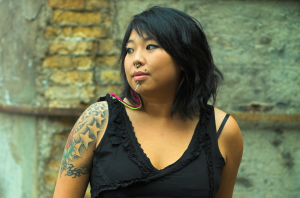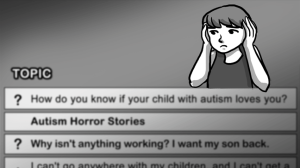
Closeup of a mouth with fangs on a black backdrop.
When people ask me who my hero or inspiration is, I always say the same thing: Buffy the Vampire Slayer. Most times, I’m greeted with a lighthearted chuckle, a gentle question of disbelief, or outright confusion.
I guess it’s odd for someone to be so affected by a fictional character, but for me, Buffy and her show were absolutely everything.
Let me offer some context.
As a child, I didn’t understand any of my identities. I didn’t understand being bigender, being a feminine AMAB, being gay, being a white-passing Latinx, being anxious, being depressed, being non-religious, and being a child in a non-nuclear family.
It was a lot for me, especially given that my anxiety and depression made it difficult for me to reach out and ask questions; I didn’t think anyone wanted to hear from me, that they would think I was stupid for asking.
And while Buffy was admittedly not a show that did well with intersectional representation – most of its characters were white, heterosexual, lower middle to upper middle class, able-bodied people – it did create a world with characters whose emotional and spiritual layers also made them difficult to understand for others and themselves.
As a confused child with many intersecting identities I didn’t know how to deal with, Buffy gave me some answers to questions that were either getting skimmed over or were too scary to ask.
My depression and anxiety only got worse as I got older. Feelings of rejection from society, for being such an odd intersection of unwanted identities, really started to settle in during middle school.
I still wasn’t brave enough or knowledgeable enough to ask for help, so I buried myself in video games where I could be other people, like Princess Peach. It served as little more than a bandaid, because the second the game was over, I was back to reality.
It wasn’t until I first saw Buffy the Vampire Slayer that things started to change for me.
Seeing the complex characters of Buffy from week to week made me feel part of something during times when I wasn’t on any teams and wasn’t part of any social group. I had no friends aside from my twin brother and my sister, both of whom were often focused on sports.
Doing little more than sitting and watching Buffy gave me an opportunity to both enjoy the entertainment and get to know myself through my reactions and thoughts on what I was seeing – and I started to love the person I discovered.
What started as entertainment became a means of survival. What started as a means of survival became a guide to thriving in life.
It gave me what I needed, when I needed it, and has since become the biggest factor in my moral, emotional, political, and spiritual compass.
I was seeing a character, Buffy specifically, who stood up for herself. I saw someone face the darkness, much like the darkness I felt myself facing, and not give up. I witnessed someone fighting through physical, mental, emotional, and spiritual pain and not letting it turn them into a cruel person.
It showed me for perhaps the first time that I didn’t have to let the nasty things in the world make me nasty, too. I realized I didn’t need to be someone “cooler,” someone “stronger,” someone who cared less than anyone else could, to survive.
So here’s how Buffy, the character and the show, help me survive depression. Note: There will be major spoilers ahead.
1. Buffy’s Community Found Opportunities to Support Her When She Was Vulnerable
Throughout the series, Buffy holds back any number of feelings and emotions. It doesn’t serve her well, particularly in later seasons when she tries to deal with her mother’s death, the financial burden of being head of household, and taking care of her grieving, confused teenage sister – all on her own.
Society often glamorizes Buffy’s emotionally evasive coping mechanisms, because they’re perceived as strong. But this is most likely because emotions are perceived as weak.
The truth is, however, Buffy’s repressed feelings about her mother’s death and the fallout from it manifest in some terrible ways, such as beginning a terribly abusive sexual relationship with Spike.
The storyline ultimately demonstrates that holding back emotions and suffering can lead to terrible places, most of which are far more painful than speaking our truths in the first place.
Like Buffy, I found myself holding back my feelings, believing I should deal with them on my own. Unlike Buffy, however, I’d start to resent the people in my life who couldn’t read my mind, behavior, or body language and deduce that I was suffering beneath the surface. I wanted support, but I didn’t want to ask for it.
I thought throughout my youth that if I held back the pain, abandonment, and loneliness that I felt that I’d become a super powerful person because of it – one that people would envy.
As you can guess, it didn’t quite work out that way.
What showed me the error in my ways was seeing how Buffy’s friends reacted when she would finally open up and share her feelings. Instead of shaming or avoiding her, Buffy’s friends embraced, supported, and listened to her. And Buffy gave them space to adjust and have their own emotional reactions and processes as well.
When we carry around the weight of heavy feelings, it shows and affects us, whether we know it or not.
I could see it on Buffy and wondered if it was easy to see on me, too. I didn’t want to drive myself into the ground anymore, and I didn’t want to pretend I was okay, because all it did was make my loneliness even greater.
If I wanted people around and I wanted help, I’d have to learn to make space for people.
2. Buffy Created Plans When Things Are Chill as an Offensive Survival Strategy
Angel, Buffy’s vampiric lover, changes into the merciless villain, Angelus, after his soul is stolen from him by an old curse. When Buffy and the Scoobies realized how dangerous and cunning the recently returned Angelus is, they decide to research him and his allies to learn how to effectively combat and repel him.
Through their work and research, Buffy and her friends were able to predict his first few moves, which would predominantly target Buffy’s friends and family. Thus, being a step ahead, they were able to regroup and stay out of his reach.
This defensive move, ultimately played out as an awesome offense, is seen clearly when Buffy blocks Angelus from entering her house in “Passion,” ruining his plan to hurt her mom.
My mental health journey has always been very much a rollercoaster. Please pardon the cliché, but I’d weather the big hills, twists, and turns, and when I eventually reached the smooth part of the ride, I’d be so happy for it that I’d forget I was still moving.
I would be so wrapped up in having survived that I wouldn’t notice myself traveling up to the precarious top of another steep drop.
I was never prepared for what might come.
I had no safety plan or strategies for dealing with my episodes. I haphazardly expected to be able to deal with everything because deep down, I always knew I was strong – but sometimes that’s not enough.
Buffy was very much a paragon of this balance. Sure, she could fight demons that popped up out of nowhere and handle them with ease, but that’s only because she studied demons and practiced combat every day with her team. And still, every once and a while, she’d encounter something that she needed help dealing with.
This reminded me not only to focus on being able to deal when I needed to, but also to set myself up for success. I needed to start thinking about how I could relax when I was stressed, or how to heal when I was hurt, or what sort of things triggered me the most. Because “being strong” is rarely enough in this world.
3. Buffy Embodies the Ideal That the Hero Isn’t Just the Person Who Kills the Monsters
My mind did the biggest mental SKRRRT when I saw Buffy bested by the series’ first big bad, The Master. I remained equally shocked throughout the series when most the major villains, at one time or another, ultimately defeated her.
I loved and admired Buffy from the start, but I didn’t understand why she was losing. She was too cool and lovable to lose. But she sure did lose.
The poignant moment came when she stood up and fought The Master again at the end of season one, even knowing she’d been easily beaten before. And after Buffy came out on top, her friends praised and loved her not because she won, but for her bravery, for trying even when there was no guarantee she’d win.
What makes Buffy a hero isn’t that she slays demons and fights bad guys – it’s that she’s human, she’s vulnerable, she’s scared, she loses, and despite all that, she keeps trying.
Throughout my life, I was (and still am) a competitive person. This is funny considering that competition actually makes me so uncomfortable. It’s not about my needing to be better than people or even because I’m that passionate about what I’m doing. Mostly, I tend to think people don’t like me and that I’m irrelevant, so I figure if I win and do well, people will automatically like me because people like winners.
When I don’t win, I feel weak, I feel incompetent, and I feel like a disappointment.
I guess you could say that I need to achieve a victory over the demons that tell me I’m unlovable and that people hate me.
After watching Buffy stand up to The Master again, it became clear to me that dealing with my anxiety and depression wasn’t about slaying them entirely or having a clear-cut victory moment. It was about trying despite failing before, despite falling back on bad habits, despite my lack of resources. I learned to love the fight, the process, and the journey, not the end.
4. Buffy Taking On Situations with No Clear Solution Shows That Sometimes There’s No ‘Good’ Choice
Out of all of these lessons I learned from Buffy, this one was perhaps the most powerful. I remember watching season two, still young and relatively naïve. I didn’t consume media that didn’t have happy endings or nice, neatly wrapped conclusions. Buffy’s season two finale could not have been further from this.
Throughout that season, Buffy is struggling with Angelus, the soulless monster that was once Angel. Each episode, I expected her to find a way to change him back, but as the season progressed, it still wasn’t happening.
I’ll never forget how frozen and confused I felt when Buffy was given two choices. Either send the love of her life to Hell or have the entire world go to Hell. She did what she had to, and immediately suffered from it, ultimately deciding to leave Sunnydale. I learned so much from that one moment.
We don’t always get happy endings. Sometimes, we have terrible decisions to make. And even when all of our options are bad, we still have to move forward.
I am the type of person who is plagued by the concept of doing “the right thing.”
More often than not, my worries lead to fear, which leads to indecision, often leaving me stuck in places because I can’t decide where or how to move.
When situations have no immediate or clear solution, I become obsessed with searching for one, figuring maybe it’s just harder to find. I like to think that there’s always a correct choice – because it makes me feel like I have more control over my life than I probably could ever have, in reality.
Deep down, it’s all about power.
As much as I wanted to have control and live a life where I get to make lots of good decisions, I had to accept that moving forward making difficult choices is better than remaining stuck. It’s better to move forward, learning hard lessons, than letting life pass you by.
5. Through Thoughtful Storylines, Buffy Shows That Wounds Don’t Heal Overnight
Buffy, as she did with so many other parts of my life, changed it all for me. I remember when I first saw her kill the love of her life in season two – both for the greater good and because she had to.
It shocked me that she mourned for the next few episodes. It blew me away when it continued until he returned. I wondered how Buffy, the badass vampire slayer herself, was still in pain.
Her friends clearly wanted her to get better. She clearly wanted to get better. But still, she was haunted and hurt and struggling.
This truth remained throughout the series, whether through adult and financial responsibilities, abandonment, or death. The characters always cried or frowned when their friends left or gave some subtle sign that behind everything they were still falling apart.
One thing that I always found difficult about most TV shows was that the characters appeared to heal from their wounds and traumas within an episode or two. Episode ten of xyz show would end in sobs and tears, only for everything to be calm and collected by episode eleven. It made me feel weak.
I began to wonder how much time was appropriate for dealing with the difficulties of life and, in my case, how much was too much. Internally, I punished myself, blaming the pain I felt on some getting-over-it ability I was too incompetent to master.
I just wanted to be “happy.” I wanted to be happy so much that I desperately searched for a villain, something or someone I could despise, fight, and destroy with all my might.
It’s hard to have a villain when there’s no one around — so I became my own villain.
I wanted to heal and recover, but because it always took so long for me to get better, I often figured the storm dissipated, not that I’d escaped or weathered it by my own means.
But Buffy showed me that it doesn’t matter whether you stop the storm with your own strength or weather it with your endurance. Either way, you’ve made it through and now have safe space to grow and get better.
But even more critically, Buffy helped me realize that the end of the storm isn’t the signal for you to immediately get over it. It’s okay to acknowledge our pain and to take our time healing.
Our wounds don’t make us weak – they make us human. They demonstrate our survival, our resilience, and our willingness to fight for ourselves and our wellbeing.
Buffy couldn’t have protected all of humanity if she didn’t nourish her own. And I can’t be the feminist writer and activist I aspire to be if I don’t care for myself either. Fortunately, Buffy gave me a blueprint on how to do just that.
[do_widget id=’text-101′]
Jayson Flores is the Editor in Chief of Gay on a Budget. They are a bigender (they/them), biracial vegan. They’ve been published in Bustle, PRIDE, Bitch, and NYLON. Roxane Gay once said she liked their voice.
Search our 3000+ articles!
Read our articles about:
Our online racial justice training
Used by hundreds of universities, non-profits, and businesses.
Click to learn more




















